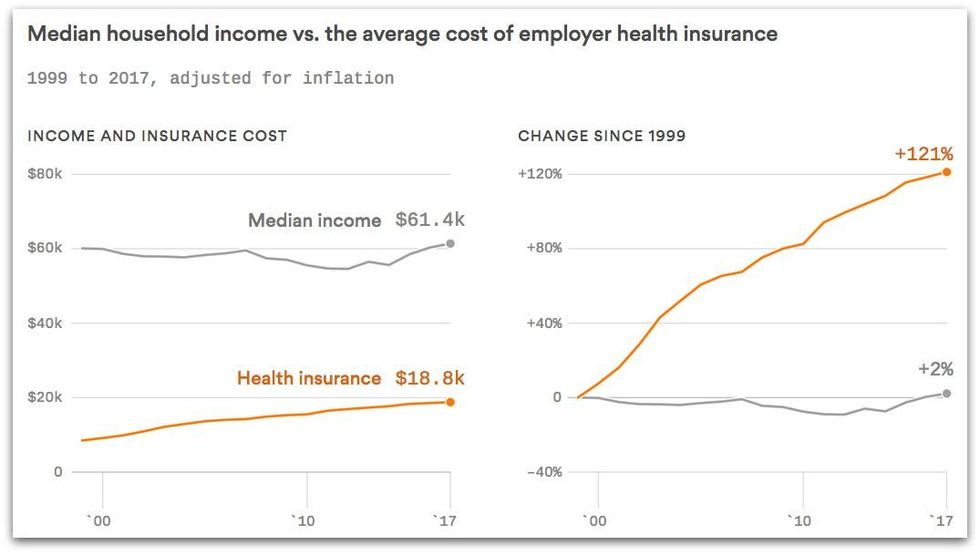Wages for most American workers have hardly budged over the past two decades, and a major culprit behind that stagnation is the soaring costs of employer-sponsored health insurance plans that some 2020 Democratic presidential candidates have defended on the campaign trail.
"Some Democratic contenders believe that a broad swath of the American public JUST LOVES employer-provided healthcare and the dizzying array of deductibles, co-pays, exclusions, humiliations, and rationing of care that comes with it."
--Bill Lueders, The Progressive
That's according to an analysis published Monday by Axios, which found that the average cost of employer-sponsored health insurance plans grew by 121 percent between 1999 and 2017. Median household income grew by just two percent during the same period.
"In 1999, the average health insurance coverage for a family consumed 14 percent of the average household income," Axios reported, citing inflation-adjusted figures from the U.S. Census Bureau and the Kaiser Family Foundation.
"By 2017, family coverage absorbed more than double that amount, to about 31 percent of take-home pay," according to Axios. "Health insurance has hovered consistently around 31 percent of household income since 2012, as companies shifted their employees to plans that had steady premiums but higher deductibles and out-of-pocket costs."
Graphics produced by Axios illustrate the extent to which healthcare costs are swallowing workers' wages:
DSA for Medicare for All, the single-payer campaign of the Democratic Socialists of America, pointed to the Axios analysis on Tuesday as yet another reason to move to a Medicare for All system that eliminates the costly private insurance plans that are eating away at workers' paychecks while generating major profits for corporations.
"As healthcare costs escalate, wages remain stagnant," tweeted DSA for Medicare for All. "Winning Medicare for All means abolishing the parasitic private insurers that generate unprecedented inequality in our society."
Former Vice President Joe Biden, Sen. Michael Bennet (D-Colo.), and other opponents of Medicare for All who are vying for the Democratic presidential nomination claim Americans like their employer-sponsored insurance and don't want to give it up for a government-run plan.
Single-payer advocates question that premise.
"Now, I hear every single day from the insurance companies and the drug companies, 'People love their health insurance companies.' That is not true," Sen. Bernie Sanders, a 2020 Democratic presidential candidate, told MSNBC last week. "People do not love their health insurance companies."
In an op-ed for the Washington Post last week, Rep. Pramila Jayapal (D-Wash.), the lead sponsor of the Medicare for All Act of 2019 in the House, called the notion that Americans like their private insurance a "myth" and pointed to the soaring costs of employer-sponsored plans.
"The average American family with employer-sponsored insurance incurs more than $28,000 dollars in healthcare costs per year, of which about $15,800, or 56 percent, is paid by employers," wrote Jayapal.
"People are happy to get rid of private insurance," Jayapal added, "they just want to know they can keep their doctors and hospitals, even if they switch or lose their jobs. Medicare for All would let them do so."
Bill Lueders, editor of The Progressive, begged Democratic presidential candidates to replace his employer-sponsored plan with Medicare for All, which would provide comprehensive healthcare coverage to everyone in the U.S. for free at the point of service.
"Apparently, some Democratic contenders--all of whom likely have vastly superior health coverage than the average voter--believe that a broad swath of the American public JUST LOVES employer-provided healthcare and the dizzying array of deductibles, co-pays, exclusions, humiliations, and rationing of care that comes with it," Lueders wrote Tuesday.
"But, personally, I don't know anyone who feels that way," said Lueders. "Most people I know hate their employer-based coverage, and for good reason."
Correction: Bill Lueders, previously managing editor of The Progressive, is now the editor. That is now accurately reflected in this piece.


